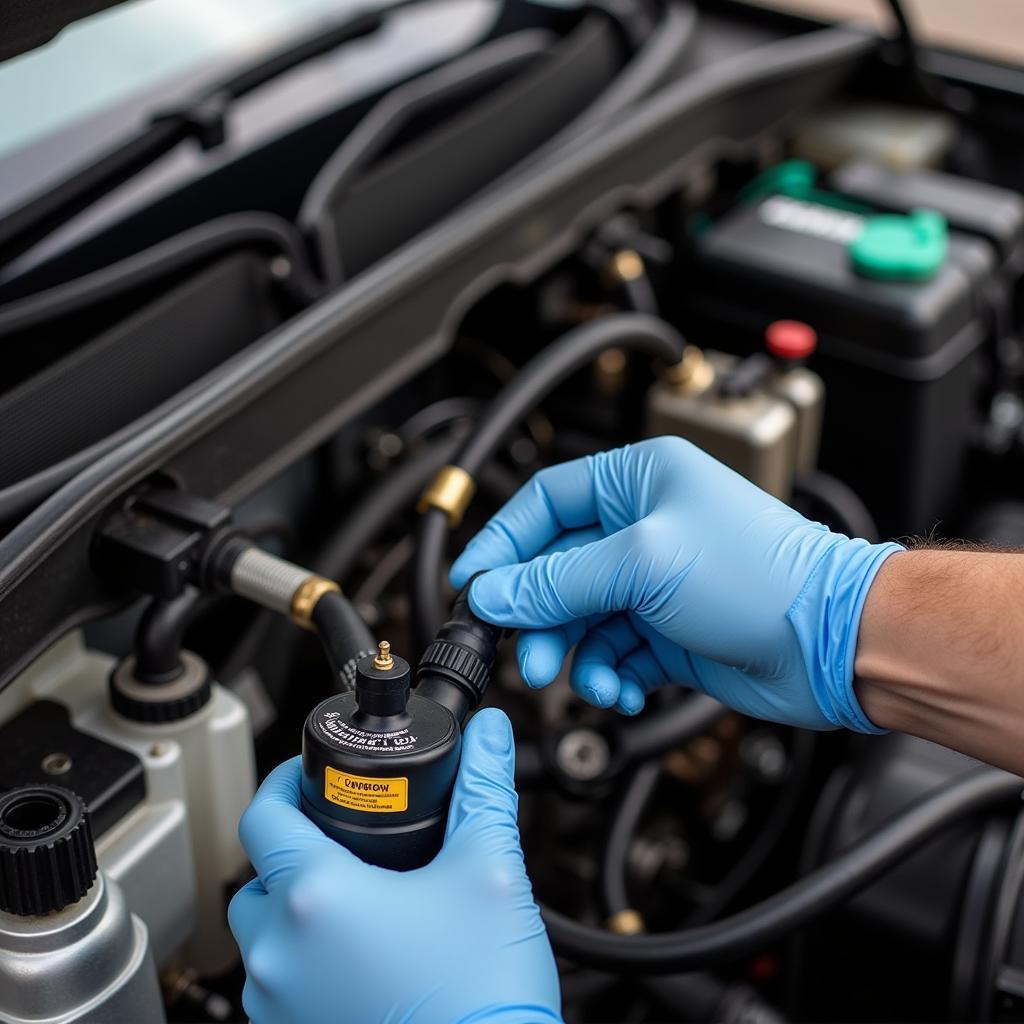A malfunctioning car AC system can make driving uncomfortable, especially during hot weather. While a full professional diagnosis is recommended, knowing how to perform a basic Free Car Air Conditioning Diagnostic can help you identify potential issues and understand the necessary repairs.
Understanding Your Car’s AC System
Before diving into the diagnostic process, it’s important to have a basic understanding of how your car’s AC system operates. It consists of several key components working together to cool and dehumidify the air inside your vehicle:
- Compressor: This component compresses and circulates refrigerant through the system.
- Condenser: Located at the front of the vehicle, the condenser cools the refrigerant and transforms it from a gas to a high-pressure liquid.
- Evaporator: Positioned inside the dashboard, the evaporator absorbs heat from the cabin air as the refrigerant evaporates back into a gas.
- Receiver/Dryer: This component stores refrigerant and removes moisture from the system.
- Expansion Valve: This valve regulates the flow of refrigerant into the evaporator.
Common AC Problems and Symptoms
Several issues can arise with your car’s AC system, each with its own set of symptoms. Here are some of the most common:
- Low Refrigerant: If your AC isn’t blowing cold air, one of the first things to check is the refrigerant level. A leak in the system can cause refrigerant to escape.
- Faulty Compressor: A malfunctioning compressor will prevent the refrigerant from circulating properly, leading to poor cooling. Listen for unusual noises coming from the compressor when the AC is on.
- Clogged Condenser: Debris and dirt can accumulate on the condenser, restricting airflow and reducing cooling efficiency.
- Electrical Problems: Issues with wiring, fuses, or sensors can disrupt the electrical signals that control the AC system.
Performing a Free Car Air Conditioning Diagnostic
While a comprehensive diagnosis requires professional equipment, you can perform some basic checks yourself to identify potential problems:
- Check the Airflow: Turn on your AC to the highest setting and feel the air coming out of the vents. Is it blowing at a reduced force? This could indicate a clogged cabin air filter or a problem with the blower motor.
- Inspect the Refrigerant Lines: Open the hood and locate the two refrigerant lines connected to the compressor. Carefully feel the lines while the AC is running. One line should be cold, while the other is warm. If both lines feel the same temperature, it could indicate low refrigerant or a compressor issue.
- Listen for Unusual Noises: Pay close attention to any strange sounds coming from the AC system, such as hissing, clicking, or grinding. These noises can be indicative of leaks, electrical problems, or a failing compressor.
- Visually Inspect the Condenser: Examine the condenser for any signs of damage, debris buildup, or bent fins. A dirty or damaged condenser can significantly reduce cooling efficiency.
 Checking Car AC Refrigerant Lines
Checking Car AC Refrigerant Lines
When to Seek Professional Help
If your initial checks don’t reveal the problem or you suspect a more serious issue, it’s crucial to consult a qualified mechanic specializing in car air conditioning diagnostics. They have the expertise and equipment to accurately diagnose and repair your AC system, ensuring optimal performance and preventing further damage.
Remember, attempting to fix complex AC problems yourself without proper knowledge and tools can be dangerous and lead to costly repairs.
Free Car Air Conditioning Diagnostic vs. Professional Diagnosis
While a free car air conditioning diagnostic can provide valuable insights into potential issues, it’s essential to understand its limitations. A professional diagnosis involves:
- Specialized Equipment: Mechanics utilize specialized tools like refrigerant leak detectors, pressure gauges, and diagnostic scanners to accurately assess the system’s health.
- In-depth Knowledge: Trained technicians possess extensive knowledge of various AC systems and can identify even the most elusive problems.
- Comprehensive Inspection: A professional diagnosis goes beyond basic checks, including a thorough inspection of all components, electrical connections, and refrigerant levels.
car aircon diagnostics near me
Conclusion
A properly functioning AC system is essential for a comfortable and enjoyable driving experience, especially during warmer months. By understanding the basics of a free car air conditioning diagnostic, you can identify potential problems and decide when professional help is needed. Remember, regular maintenance and timely repairs are crucial to keeping your car’s AC system running smoothly for years to come.
FAQs
1. How often should I service my car’s AC system?
It’s generally recommended to have your car’s AC system serviced annually or every 15,000 miles, whichever comes first.
2. What are the signs of a refrigerant leak?
Signs of a refrigerant leak include a hissing sound from the AC system, a noticeable decrease in cooling performance, and oily residue around the AC components.
3. Can I add refrigerant to my car’s AC myself?
While DIY refrigerant recharge kits are available, it’s highly recommended to have a professional handle refrigerant recharges. Incorrect handling of refrigerant can be dangerous and environmentally harmful.
4. How much does a professional car air conditioning diagnostic cost?
The cost of a professional car air conditioning diagnostic can vary depending on the location, the complexity of the issue, and the labor rates of the mechanic. However, it’s a worthwhile investment to ensure accurate diagnosis and repair.
5. How long does it take to diagnose a car AC problem?
The time required to diagnose a car AC problem can range from 30 minutes to a few hours, depending on the complexity of the issue.
Looking for more information about car diagnostics?
Need help with your car’s AC system?
Contact us via WhatsApp: +1(641)206-8880, Email: [email protected]. Our team is available 24/7 to assist you.

Leave a Reply